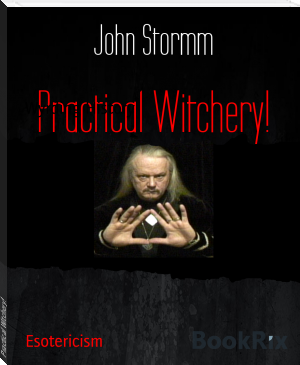Esoteric Christianity, or The Lesser Mysteries by Annie Besant (best 7 inch ereader TXT) 📖

- Author: Annie Besant
Book online «Esoteric Christianity, or The Lesser Mysteries by Annie Besant (best 7 inch ereader TXT) 📖». Author Annie Besant
Such is the kosmic process, and in human evolution it is repeated; "as above, so below."
The Trinity of the Spirit in man, being in the divine likeness, must show out the divine characteristics, and thus we find in him Power, which, whether in its higher form of Will or its lower form of Desire, gives the impulse to his evolution. We find also in him Wisdom, the Pure Reason, which has Love as its expression in the world of forms, and lastly Intelligence, or Mind, the active shaping energy. And in man also we find that the manifestation of these in his evolution is from the third to the second, and from the second to the first. The mass of humanity is unfolding the mind, evolving the intelligence, and we can see its separative action everywhere, isolating, as it were, the human atoms and developing each severally, so that they may be fit materials for building up a divine Humanity. To this point only has the race arrived, and here it is still working.
As we study a small minority of our race, we see that the second aspect of the divine Spirit in man is appearing, and we speak of it in Christendom as the Christ in man. Its evolution lies, as we have seen, beyond the first of the Great Initiations, and Wisdom and Love are the marks of the Initiate, shining out more and more as he develops this aspect of the Spirit. Here again is it true that "no man cometh to the Father but by Me," for only when the life of the Son is touching on completion can He pray: "Now, O Father, glorify Thou Me with Thine own Self, with the glory which I had with Thee before the world was."[290] Then the Son ascends to the Father and becomes one with Him in the divine glory; He manifests self-existence, the existence inherent in his divine nature, unfolded from seed to flower, for "as the Father hath life in Himself, so hath He given to the Son to have life in Himself."[291] He becomes a living self-conscious Centre in the Life of God, a Centre able to exist as such, no longer bound by the limitations of his earlier life, expanding to divine consciousness, while keeping the identity of his life unshaken, a living, fiery Centre in the divine Flame.
In this evolution now lies the possibility of divine Incarnations in the future, as this evolution in the past has rendered possible divine Incarnations in our own world. These living Centres do not lose Their identity, nor the memory of Their past, of aught that They have experienced in the long climb upwards; and such a Self-conscious Being can come forth from the Bosom of the Father, and reveal Himself for the helping of the world. He has maintained the union in Himself of Spirit and Matter, the duality of the Second Person--all divine Incarnations in all religions are therefore connected with the Second Person in the Trinity--and hence can readily re-clothe Himself for physical manifestation, and again become Man. This nature of the Mediator He has retained, and is thus a link between the celestial and terrestrial Trinities, "God with us"[292] He has ever been called.
Such a Being, the glorious fruit of a past universe, can come into the present world with all the perfection of His divine Wisdom and Love, with all the memory of His past, able by virtue of that memory to be the perfect Helper of every living Being, knowing every stage because He has lived it, able to help at every point because He has experienced all. "In that He Himself hath suffered being tempted, He is able to succour them that are tempted."[293]
It is in the humanity behind Him that lies this possibility of divine Incarnation; He comes down, having climbed up, in order to help others to climb the ladder. And as we understand these truths, and something of the meaning of the Trinity, above and below, what was once a mere hard unintelligible dogma becomes a living and vivifying truth. Only by the existence of the Trinity in man is human evolution intelligible, and we see how man evolves the life of the intellect, and then the life of the Christ. On that fact mysticism is based, and our sure hope that we shall know God. Thus have the Sages taught, and as we tread the Path they show, we find that their testimony is true.
CHAPTER X.
PRAYER.[294]
What is sometimes called "the modern spirit" is exceedingly antagonistic to prayer, failing to see any causal nexus between the uttering of a petition and the happening of an event, whereas the religious spirit is as strongly attached to it, and finds its very life in prayer. Yet even the religious man sometimes feels uneasy as to the rationale of prayer; is he teaching the All-wise, is he urging beneficence on the All-Good, is he altering the will of Him in "whom is no variableness, neither shadow of turning?"[295] Yet he finds in his own experience and in that of others "answers to prayer," a definite sequence of a request and a fulfilment.
Many of these do not refer to subjective experiences, but to hard facts of the so-called objective world. A man has prayed for money, and the post has brought him the required amount; a woman has prayed for food, and food has been brought to her door. In connection with charitable undertakings, especially, there is plenty of evidence of help prayed for in urgent need, and of speedy and liberal response. On the other hand, there is also plenty of evidence of prayers left unanswered; of the hungry starving to death, of the child snatched from its mother's arms by disease, despite the most passionate appeals to God. Any true view of prayer must take into account all these facts.
Nor is this all. There are many facts in this experience which are strange and puzzling. A prayer that perhaps is trivial meets with an answer, while another on an important matter fails; a passing trouble is relieved, while a prayer poured out to save a passionately beloved life finds no response. It seems almost impossible for the ordinary student to discover the law according to which a prayer is or is not productive.
The first thing necessary in seeking to understand this law is to analyse prayer itself, for the word is used to cover various activities of the consciousness, and prayers cannot be dealt with as though they formed a simple whole. There are prayers which are petitions for definite worldly advantages, for the supply of physical necessities--prayers for food, clothing, money, employment, success in business, recovery from illness, &c. These may be grouped together as class A. Then we have prayers for help in moral and intellectual difficulties and for spiritual growth--for the overcoming of temptations, for strength, for insight, for enlightenment. These may be grouped as Class B. Lastly, there are the prayers that ask for nothing, that consist in meditation on and adoration of the divine Perfection, in intense aspiration for union with God--the ecstasy of the mystic, the meditation of the sage, the soaring rapture of the saint. This is the true "communion between the Divine and the human," when the man pours himself out in love and veneration for THAT which is inherently attractive, that compels the love of the heart. These we will call Class C.
In the invisible worlds there exist many kinds of Intelligences, which come into relationship with man, a veritable Jacob's ladder, on which the Angels of God ascend and descend, and above which stands the Lord Himself.[296] Some of these Intelligences are mighty spiritual Powers, others are exceedingly limited beings, inferior in consciousness to man. This occult side of Nature--of which more will presently be said[297]--is a fact, recognised by all religions. All the world is filled with living things, invisible to fleshly eyes. The invisible worlds interpenetrate the visible, and crowds of intelligent beings throng round us on every side. Some of these are accessible to human requests, and others are amenable to the human will. Christianity recognises the existence of the higher classes of Intelligences under the general name of Angels, and teaches that they are "ministering spirits, sent forth to minister;"[298] but what is their ministry, what the nature of their work, what their relationship to human beings, all that was part of the instruction given in the Lesser Mysteries, as the actual communication with them was enjoyed in the Greater, but in modern days these truths have sunk into the background, except the little that is taught in the Greek and Roman communions. For the Protestant, "the ministry of angels" is little more than a phrase. In addition to all these, man is himself a constant creator of invisible beings, for the vibrations of his thoughts and desires create forms of subtle matter the only life of which is the thought or the desire which ensouls them; he thus creates an army of invisible servants, who range through the invisible worlds seeking to do his will. Yet, again, there are in these worlds human helpers, who work there in their subtle bodies while their physical bodies are sleeping, whose attentive ear may catch a cry for help. And to crown all, there is the ever-present, ever-conscious Life of God Himself, potent and responsive at every point of His realm, of Him without whose knowledge not a sparrow falleth to the ground,[299] not a dumb creature thrills in joy or pain, not a child laughs or sobs--that all-pervading, all-embracing, all-sustaining Life and Love, in which we live and move.[300] As nought that can give pleasure or pain can touch the human body without the sensory nerves carrying the message of its impact to the brain-centres, and as there thrills down from those centres through the motor nerves the answer that welcomes or repels, so does every vibration in the universe, which is His body, touch the consciousness of God, and draw thence responsive action. Nerve-cells, nerve-threads, and muscular fibres may be the agents of feeling and moving, but it is the _man_ that feels and acts; so may myriads of Intelligences be the agents, but it is God who knows and answers. Nothing can be so small as not to affect that delicate omnipresent consciousness, nothing so vast as to transcend it. We are so limited that the very idea of such an all-embracing consciousness staggers and confounds us; yet perhaps a gnat might be as hard bestead if he tried to measure the consciousness of Pythagoras. Professor Huxley, in a remarkable passage, has imagined the possibility of the existence of beings rising higher and higher in intelligence, the consciousness ever expanding, and the reaching of a stage as much above the human as the human is above that of the blackbeetle.[301] That is not a flight of the scientific imagination, but a description of a fact. There is a Being whose consciousness is present at every point of His universe, and therefore can be affected from any point. That consciousness is not only vast in its field, but inconceivably acute, not diminished in delicate capacity to respond because it stretches its vast area in every direction, but is more responsive than a more limited consciousness, more perfect in understanding than the more restricted. So far from it being the case that the more exalted the Being the more difficult would it be to reach His consciousness, the very reverse is true. The more exalted the Being, the more easily is His





Comments (0)